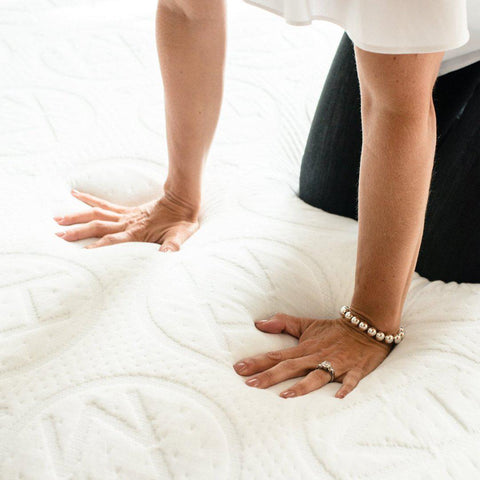How does plant-based memory foam compare to traditional?
Just how well do plant-based memory foam compare to traditional memory foam mattresses? Many shoppers are surprised to learn there are differences and may not realize what characteristics distinguish one from the other.
In order for consumers to learn more about the similarities and differences let's take an in-depth look at the two types.
Traditional vs Plant-Based Memory Foam
No stranger to the game, traditional forms of viscoelastic material have been used in bedding for over 20 years now. Memory foam continues gaining popularity among consumers, and in the past ten years this has inevitably meant more options coming to the market. Though this type of bed consistently rates higher than spring beds in terms of comfort and overall satisfaction, there are few issues that newcomers like plant-based foams have sought to address.
SHOP FOR PLANT BASED FOAM MATTRESSES
Traditional Foam
Traditional memory foam mattresses are made from petroleum-based polyurethane. The process was originally developed by NASA, later purchased and introduced into the mass market. This type of foam is temperature-sensitive, meaning it reacts by hardening in cold spaces and softening in warm.

Plant-based Memory Foam
Though traditional foam has been a popular option for many years, there are few complaints which newer variations have sought to address such as heat retention, odours and chemicals, excessive viscosity, and firmness unpredictability. Plant-based memory foam replaces a portion of the petroleum products with plant-derived oils.
In addition to being considered more eco-friendly, some types of plant-based memory foam have actually been shown to improve breathability and eliminate other concerns without heat-retention issues. Certi-PUR® certified plant-based foams are also free of chemicals like CFCs, formaldehyde, phthalates, PBDEs, and are low in VOCs, all of which have been cause for concern in traditional memory foams.
Health / Off-gassing
For our purpose during this article, health refers to potentially harmful chemicals used in the composition of the mattresses, which is closely tied to the potential for off-gassing and the release of volatile organic compounds (VOCs). This is a group of more than 60 chemicals that are considered to present health hazards when people suffer prolonged exposure. With the average person spending 8 hours, or one-third of their day in close contact with their mattress, chemicals can pose a serious concern.
- Plant-based memory foam mattresses manufactured by Haven Sleep have been certified by Certi-PUR®. This certification means they don’t contain toxic chemicals, heavy metals, or dangerous additives. There is an initial “new” odour as with most new products; however it dissipates within a few days and is mentioned by fewer than 5% of reviewers.
- Traditional memory foam brands usually remain tight-lipped about their formula, usually saying the beds are free of harmful VOCs, formaldehyde and CFCs. But, traditional memory foam made from petroleum has been associated with the release of VOCs, which can continue for the life of the product. A lot of companies have no third party certifications, and about 18-20% of reviewers mention odour; some of which, smelled so bad that they were forced to return their bed.
Sleeping Hot/Trapped Heat
Most people prefer to feel cooler when sleeping, and it is proven that cooler temperatures improve sleep quality. Thus, heat and memory foam has become a hot topic in recent years and is a top concern for some.
- Haven uses an open-celled foam with greater breathability than traditional foams. This appears to bear out in reviews, with less 2-5% of reviewers complaining of sleeping hot. Even roughly 5% of conventional innerspring owners complain of heat, so this percentage is well below average for foam mattresses.
- Sleeping hot has been a complaint from owners of traditional foam beds since they were first introduced. The closed-cell nature of the foam structure may contribute to trapped heat, especially on denser and thicker models. In reviews, approximately 10-15% of owners complain of sleeping hot, some to the point of excess sweating affecting the mattress.
Response Time
The response time of a foam refers to how quickly it returns to its original shape or re-contours to the movements of the sleeper. This affects how easily a person can move and change position, as well as intimate moments.
- Plant-based memory foam mattresses from Haven feature a slow response time which imitates a sort of "sinking" feeling. They also are stable in firmness since the material is not affected by ambient temperatures. Very few reviews mentioned anything about difficulty moving or other issues related to response time.
- About 15-18% of traditional foam mattress owners complain of issues with response time or ease of movement, likely due to the temperature sensitive properties. Some mention the bed being too hard, then too soft to move after it warms up.

Price
Savvy shoppers generally approach a major purchase with the objective of receiving the best value for the money they spend. This can include watching for sales, as well as understanding that name brands do not necessarily equate with quality.
Many well-known lines from clothing to cars to mattresses spend a great deal of money on advertising which is generally passed on to the consumer. They may be status symbols, but in reality, once the sheets go, on the mattress tag doesn’t matter – but comfort, quality, and health do.
When researching different types of beds, it can be helpful to compare performance factors using actual owner opinions rather than relying on cost, commercials, or branding to make shopping decisions. Reading the unbiased reviews of current owners should influence your decision much more than flashy advertising.
Individual mattresses vary, however upon comparison the average shoppers will identify differences between foam types for product research purposes. Plant-based memory foam mattresses are relatively new, but they out-perform their synthetic competitors in every category.






0 comments